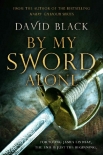By My Sword Alone by David Black (best e books to read .TXT) 📗

- Author: David Black
Book online «By My Sword Alone by David Black (best e books to read .TXT) 📗». Author David Black
When he turned to his front, the Russian hussars walking up the hill towards him and Colonel Lindsay were markedly closer. Beart wasn’t exactly sure what his officer was going to require of him, but discipline prevented him from asking.
James was watching the Russians, too. But he was thinking about the Gräfin Dorothea.
He remembered standing in the shadow of de Monti at some rout, with the din of the place so oppressive as to inhibit all speech, when he first saw her without knowing her name. It was later, on a patio, shuffling, trying to disengage from one of Stanislas’ entourage, that she had approached him, all coquettish, with a fluttering fan – the late summer warmth had rendered many of the more agricultural nobility as fragrant as their livestock.
‘You look lost, my pułkownik Dzików,’ she’d said, the first in French, the latter in Polish. And when he looked blankly at her, she added, ‘Mon colonel des Sangliers.’ Then she’d introduced herself.
Here was the lady who might offer guidance.
‘Ah, m’selle gräfin,’ he’d replied with an innocent smile. ‘May I present myself. The Chevalier James Lindsay, colonel of the Dzików dragoons, as you obviously are aware, formerly in the service of King James III, the rightful sovereign of Great Britain, and now in the service of the King of Poland ...’
‘Whoever he may turn out to be,’ she interrupted, with her coquettish smile, and James had bowed at her wit, smiling.
‘Indeed,’ he said. ‘I was told to look out for you, gräfin, by someone I believe to be a mutual acquaintance.’
‘It is my turn to say, “indeed”. To whom do you refer?’
‘The French minister to the Holy See, the Comte de Valençay.’
And at that her gaze had turned to steel, and she’d recoiled from him.
‘Tell me, chevalier,’ she said, her voice cold as ice, ‘be candid, I beg … has the comte sent you here to kill me?’
The dismounted rank of his dragoons had now reformed themselves as infantry; two solid lines of musketeers, one standing, one kneeling, their officers, swords drawn, on either flank and their weapons pointed up towards the brow where James and Beart sat, minding the advance of the Russian hussars.
James looked to his right, where his detached troops had now wheeled, and were dressing their line. Looking most martial, yet facing nothing but a field of grass, sloping gently from their right to left. James had spent many a day in his father’s library, studiously reading the accounts of Marlborough’s campaigns on the Danube and in the low countries back in the first decade of the century, and as he sat up to see if he could catch any glimpse of the detached Russian troops, he hoped he’d remembered the great general’s tactics correctly.
The Russians to his front now were becoming perilously close; he could even make out the individual mustachios on the front rank’s troopers. He turned to Beart, and said, ‘M’sieur, I think it time we judiciously hid behind your squadron.’
The two officers cantered down the back of the rise, and behind the double rank of dragoons, James calling out in a parade ground voice, ‘The first rank will fire only when the enemy begins his advance! The second rank will step through and kneel, while the first rank re-loads! The second rank will fire! The first rank will step through while second rank will re-mount! The first rank will fire, and then re-mount!’
He looked along the grim, dumb ranks of his men. They had practised this often enough, and initially their drills had invariably turned into Bartholomew’s Fair, which James had never attended but had seen etchings enough. But the men before him today looked a lot more capable. It was not them he was worried about. It was the deployment of his detachment, under that young Polish captain, Poinatowski.
No sooner had he and Beart wheeled behind the ranks, than the Russians breasted the rise, a long line of sky-blue, their horses still walking. James was convinced he sensed a flinch as they confronted the Dzików dragoons’ double line of muskets.
This was the moment. There was the enemy. He was about to lead men in battle for the first time. He swallowed hard. He’d always imagined his mind would be wonderfully focused when the time came, except that now that it had, his mind wasn’t. He couldn’t stop thinking about who he was about to start fighting for.
Stanislas. The man the Russians didn’t want to assume the crown of Poland. It was him who had the quarrel with the Russians, not James Lindsay. In fact, James Lindsay felt no animosity whatsoever for these poor bastards in front of him.
But then that was, of course, the point of this new life. He wasn’t supposed to be fighting for a cause or a king anymore, he was fighting for gold now. So you’d better get used to it, he said to himself; and the idea seemed so ridiculous it made him laugh, a loud, sardonic laugh, for the naive youth he used to be, intended only for himself. But the Dzików heard it too.
They also heard the bellowed, incomprehensible orders coming from the Russian line.
They were a little over 300 paces away – nowhere near enough distance for the Russians to get some momentum behind their charge, but far enough for the Dzików to fire two volleys into them. There was the sudden swish of sabres being drawn, and James caught the flash of unsheathed steel along the Russians’ line. Then nothing, no movement, no sounds but the odd snort of a horse, or the sound of others





Comments (0)